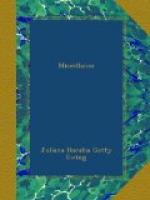Her long illness, perhaps, did less to teach us to do without her, than long illnesses commonly do; because her sick-room was so little like a sick-room, and her interests never narrowed to the fretful circle of mere invalid fears and fancies. The strong sense of humour, which never left her, helped her through many a petty annoyance; and to the last she kept one of her most striking qualities, so well described by Trench—
—— “a child’s pure delight in little things.”
Whatever interest this little record of some of my mother’s tastes and acquirements may have for her young readers, its value must be in her example.
Whatever genius she may have had, her industry was far more remarkable. The pen of a ready writer is not grasped by all fingers, and gifts are gifts, not earnings. But to cultivate the faculties God has given us to His glory, to lose petty cares, ignoble pleasures, and small grievances, in the joy of studying His great works, to be good to His creatures, to be truthful beyond fear or flattery, to be pure of heart and tongue far beyond the common, to keep up an honest, zealous war with wickedness, and never to lose heart or hope for wicked men—these things are within the power as well as the ambition of us all.
I must point out to some of the young aspirants after her literary fame, that though the date in Elizabeth Smith’s Remains shows my mother to have been only eleven years old when she got it, and though she worked and studied indefatigably all her girlhood, her first original work was not published till she was forty-two years old.
Of the lessons of her long years of suffering I cannot speak. A form of paralysis which left her brain as vigorous as ever, stole the cunning from her hand, and the use of her limbs and voice, through ten years of pain and privation, in which she made a willing sacrifice of her powers to the will of God.
If some of her magazine children who enjoy “advantages” she never had, who visit places and see sights for which she longed in vain, and who are spared the cross she bore so patiently, are helped by this short record of their old friend, it may somewhat repay the pain it has cost in writing.
Trench’s fine sonnet was a great favourite of my mother’s—
“To leave unseen so
many a glorious sight,
To leave so many lands unvisited,
To leave so many books unread,
Unrealized so many visions
bright;—
Oh! wretched yet inevitable
spite
Of our short span, and we
must yield our breath,
And wrap us in the unfeeling
coil of death,
So much remaining of unproved
delight,
But hush, my soul, and vain
regrets be still’d;
Find rest in Him Who is the
complement
Of whatsoe’er transcends
our mortal doom,
Of broken hope and frustrated
intent;
In the clear vision and aspect
of Whom
All wishes and all longings
are fulfill’d.”




